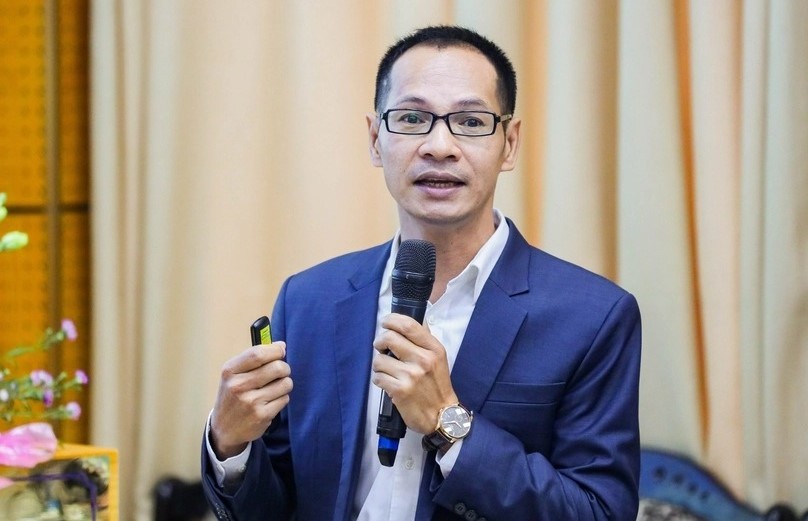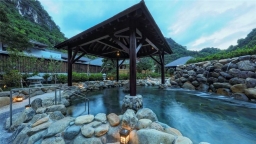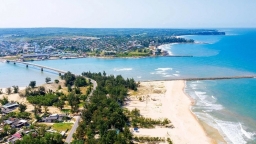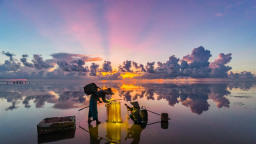Vietnam boasts huge potential for wellness tourism development

Real estate consultant Nguyen Hoang. Photo by The Investor/Trong Hieu.
In recent years, people have grown used to the term "wellness life" or "healthy life". This trend has grown stronger since the appearance of Covid-19, resulting in a higher demand for a healthy life.
“Wellness life” contains many aspects from culture and lifestyle to economy, including nutrition, sports, health care, spa, and environmental protection. All of these combined with tourism activities create “wellness tourism”.
Global trends
According to a report released by the Global Wellness Institute (GWI), the global wellness economy was valued at $4.4 trillion in 2020 despite the widespread impacts of the pandemic, and is expected to reach $7 trillion in 2025.
Asia took the lead with a value of $1.5 trillion and a growth rate of about 8.1% from 2017 to 2019, as compared to 6.6% of the world average.
Wellness tourism value alone reached $617 billion in 2017 and $720 billion in 2019. This is predicted to increase to $816.5 billion this year and to exceed $1,127 billion in 2025, with a likely average growth of 20.9% per annum.
In Asia, China, Japan, India, Thailand, South Korea and Malaysia were among the top 20 wellness tourism markets in the world in 2020, with respective turnovers of $19.5 billion, $19.1 billion, $7.2 billion, $4.7 billion, $4.3 billion and $3.5 billion.
Wellness tourism includes a wide range of activities from sightseeing, nursing, medical treatment-rehabilitation and spa breaks to culture and belief practicing, healthy eating breaks and local community exchanges.
The leading countries in this model include Japan with onsen bathing that creates a Japanese resort tourism brand; South Korea with salt crystal bathing; India with tours featuring meditation and yoga retreats; and Thailand with resorts for retirees.
Notably, wellness tourism spending is always higher than that for regular tourism, with foreign visitors’ spending 35% higher and domestic tourists’ 77% higher. Especially the cost of rooms in resorts is always high, ranging from a few hundred to thousands of U.S. dollars a night, even in Vietnam.
The above figures show that the wellness tourism industry is very attractive and will further grow in the future. It makes a significant contribution not only to the national economy but also to the development of social life.
Potential in Vietnam
In Asia, Vietnam is considered a country with a lot of potential for wellness tourism development. The country is expected to become a leading destination as it possesses diverse natural landscapes, a long coastline of 3,200 kilometers featuring beaches considered among the world's most beautiful, and subtropical climate.
It also boasts many hot mineral springs, a traditional medicine sector with herbal sources very suitable for health care, world heritages, historical relics, beliefs, and cultural diversity. Especially, attractive foods and cheaper travel costs compared to many other Asian countries are also the country’s advantages.
This type of tourism has taken root in Vietnam in recent years with mineral spring attractions in all three regions of the country, along with eco-tourism cultural activities. For example, there are high-end health care resorts with hot mineral springs in Quang Ninh province, Hue town, Danang city, Ho Tram-Binh Chau in Ba Ria-Vung Tau province, Nha Trang town of Khanh Hoa province, or herbal baths of the Dao ethnic minority people in some northern provinces.
In addition to its natural potential, Vietnam also boasts fast-growing middle and upper classes and flourishing tourism activities, meaning more spending in the wellness sector.

Mud bathing in Nha Trang, central Vietnam. Photo courtesy of the town's tourism authority.
In 2019, before the Covid-19 outbreak, domestic tourists totaled nearly 85 million, creating a revenue of VND334,000 billion ($14.5 billion) for the sector. Besides, every year many Vietnamese expats return to their home country for dental and beauty care and traditional medicine therapy. Meanwhile, each year thousands to tens of thousands of Vietnamese travel abroad for medical treatment and travel, spending billions of U.S. dollars.
Challenges
Despite great potential, wellness tourism in Vietnam is still of small scale, mainly based on the spontaneous activities of companies. In addition, there remain a lot of difficulties and challenges.
First of all, wellness tourism is still a new concept in Vietnam and as such, lacks clear definitions, development orientations, criteria and standards. It is simply understood as spa breaks, mineral bathing, mud bathing, yoga retreats and meditation. Those services are now simply utilities of a resort, and do not yet form an overall system.
Most importantly, there is no overall policy orientation for land planning, investment incentives, certification standards and other procedures. Coordination between the tourism, health care, and sports sectors is also limited.
The absence of an overall policy orientation has led to spontaneous and scattered development of health care tourism. Many providers have also shown a lack of professionalism and abused this type of service for their own interests. Meanwhile, marketing and promotion campaigns both within and outside the country for highlighting wellness-based lifestyle options are limited.
The third challenge is the environment, a matter of worldwide concern. Every day the media reports, whether in Vietnam or around the world, global climate change, extreme weather, global warming, sea level rise, forest fires and floods, along with the inappropriate exploitation, even destruction of natural resources via the massive construction of hydroelectric power plants, destructive fishing, and uncontrolled use of agrochemicals.
The fourth challenge is capital. It has a direct impact on resort tourism and is also a bottleneck to its development. Resort real estate, a very important factor in resort-wellness tourism, is currently subject to biggest credit restrictions amid the central bank's tight control of real estate credit.
The resort real estate segment has become stagnant since 2009. Limited capital has left many projects unfinished or operating inefficiently, affecting not only the economic efficiency but also infrastructure facilities of the sector.
These important and fundamental challenges are barriers to the development of wellness tourism in Vietnam.
Solutions
In order to fully tap the potential, it is necessary to solve the above-mentioned difficulties and challenges. At many seminars and in reports, businesses and experts have put forth a number of solutions for the future development of the sector.
The first is to design a policy to support its development in line with the national tourism development strategy for 2025 and 2030.
Secondly, Vietnam’s overall tourism development planning or national land use planning must include the use of land associated with tourism and the conservation of natural resources and the environment.
The third solution is to build a national network connecting professional areas like health care, sports, culture, arts and beliefs in overall tourism development to increase the quality and economic value of wellness tourism.
Next is to build a mechanism to help investors gain better access to capital sources. For example, allowing foreigners to buy condotel products will mean not only more capital inflow but also lure more wellness tourists to Vietnam.
The fifth is to strengthen management capacity from standardizing service criteria and monitoring quality and safety to professional issues related to the health of service users.
Last but not least, it is necessary to strengthen the promotion of Vietnam’s wellness tourism by increasing budgets for advertisement and organizing events through media channels as well as diplomatic, cultural, sports and economic activities.
With the synchronous implementation of all the above solutions, in the next five years, wellness tourism could develop stronger and make up a larger proportion of the national or local economic structure, helping Vietnam secure a more important position on the global wellness tourism map.
* Nguyen Hoang is one of the leading real estate consultants in Vietnam.
- Read More
Vietnam SOEs need tailored mechanisms, greater autonomy to accelerate tech investment, innovation: execs
Vietnam's state-owned enterprises (SOEs) need flexible, tailored mechanisms to make rapid decisions, maintain a leading role, drive innovation, and boost competitiveness, said company executives.
Companies - Sun, November 23, 2025 | 8:16 pm GMT+7
Café Amazon retreats, Mixue scales down in Vietnam over intense competition
Vietnam’s food and beverage (F&B) sector is seeing a wave of closures and market exits as rising competition and shifting consumer preferences squeeze profit margins.
Economy - Sun, November 23, 2025 | 2:36 pm GMT+7
Vietnam Education Publishing House strengthens cooperation with Malaysia’s Pelangi Publishing Group
Vietnam Education Publishing House (VEPH) met with Malaysia’s Pelangi Publishing Group in mid November to expand professional exchange and explore deeper cooperation in educational publishing.
Companies - Sun, November 23, 2025 | 12:21 pm GMT+7
French energy giant plans $500 mln investment in green Vietnam projects
French green hydrogen infrastructure developer HDF Energy is looking to invest $500 million in potential energy and transport projects across Vietnam, particularly the southern economic hub of Ho Chi Minh City.
Energy - Sun, November 23, 2025 | 11:29 am GMT+7
Vincom Retail estimated to book $72 mln profit from Hanoi mall sale: broker
Vincom Retail (HoSE: VRE), Vietnam’s leading retail property developer, is set to record an estimated VND1.9 trillion ($72 million) in profit after completing the divestment of its entire equity interest in a Hanoi project last month, according to a report by BSC Securities.
Real Estate - Sun, November 23, 2025 | 8:00 am GMT+7
Market watchdog conference in central Vietnam offers insight into amended securities law
A conference recently held by the State Securities Commission (SSC) in Danang briefed companies and market participants in central Vietnam on amendments to the Securities Law and guiding documents, as part of the authority's 2025 legal dissemination plan.
Finance - Sat, November 22, 2025 | 9:48 pm GMT+7
Central Retail incurs 6% drop in Jan-Sept revenue from Vietnam
Thailand’s top retailer Central Retail posted revenues of nearly THB35.48 billion ($1.09 billion) in Vietnam in the first nine months of this year, down 6.6% year-on-year due to exchange rate fluctuations.
Companies - Sat, November 22, 2025 | 3:32 pm GMT+7
Young leadership mindset drives SHB bank's next growth phase: exec
Young leadership would play a pivotal role as Vietnamese businesses navigate digital transformation and rising global competition, said Do Quang Vinh, vice chairman cum deputy CEO of Saigon-Hanoi Commercial Joint Stock Bank (SHB).
Banking - Sat, November 22, 2025 | 3:23 pm GMT+7
Stock market regulator holds final round of ESG-focused corporate governance contest in Hanoi
The final round of the “Vietnam ESG Challenge 2025”, a competition aimed at promoting sustainable development, modern corporate governance, and social responsibility among Vietnamese university students, took place in Hanoi on Monday.
Finance - Sat, November 22, 2025 | 10:16 am GMT+7
IFC, Vietnam's EVNNPT discuss investment in power transmission projects
Vietnam's National Power Transmission Corporation (EVNNPT) and the International Finance Corporation (IFC), a member of the World Bank Group, have discussed issues related to potential cooperation and investment in power transmission projects under the Power Development Plan VIII (PDP VIII).
Companies - Sat, November 22, 2025 | 9:23 am GMT+7
Earnings strength meets market consolidation
Global appetite for emerging markets is still cautious, constrained by high returns in developed markets amid geopolitical uncertainty, while pressure on the Vietnamese dong has been compounded by seasonal FDI profit repatriation, writes Minh Dang, head of research at Dragon Capital.
Economy - Sat, November 22, 2025 | 8:00 am GMT+7
Phat Dat pursues HCMC housing project after a decade as it restructures property portfolio
Phat Dat Real Estate Development Corp (PDR) has moved to acquire a 50% stake in AKYN Investment Trading Service JSC as part of efforts to revive a long-delayed residential project in central Ho Chi Minh City, the company said in a board resolution. Financial terms were not disclosed.
Real Estate - Fri, November 21, 2025 | 9:30 pm GMT+7
F88 wins dual workplace awards for 2025
Vietnam’s consumer finance major F88 has been named one of "Vietnam Best Places to Work" and a “Happiness at Work” enterprise for 2025.
Companies - Fri, November 21, 2025 | 4:07 pm GMT+7
European IP developer CTP plans large industrial-logistics project in northern Vietnam port city
CTP, a Dutch-led industrial park developer headquartered in the Czech Republic, is exploring a large integrated complex combining seaports, an airport, logistics facilities and industrial parks in the northern port city of Hai Phong.
Infrastructure - Fri, November 21, 2025 | 3:24 pm GMT+7
Vingroup to build $334 mln international port in central Vietnam
Vietnam's leading private conglomerate Vingroup will develop a modern, large-scale international port named Son Duong at the Vung Ang Economic Zone in Ha Tinh province.
Infrastructure - Fri, November 21, 2025 | 3:10 pm GMT+7
HCMC ready to operate International Financial Center: city authorities
Ho Chi Minh City has completed preparations across infrastructure, spatial planning, digital systems, organizational apparatus, and human resources to ensure Vietnam's International Financial Center can begin operating immediately after the Government issues its guiding decrees.
Economy - Fri, November 21, 2025 | 2:11 pm GMT+7
- Travel
-
Impressive Standard Chartered Hanoi Marathon Heritage Race 2025
-
Nguyen Hong Hai wins 'Investors' golden heart' golf tournament 2025
-
140 players compete at “Investors’ golden heart” golf tournament
-
‘Investors’ golden heart’ golf tournament to tee off on Saturday
-
Vietnam, Hong Kong Aircraft Engineering sign deal on aircraft maintenance hub at northern airport
-
Sun Group gets nod for $375 mln inland waterway tourism project in central Vietnam
























